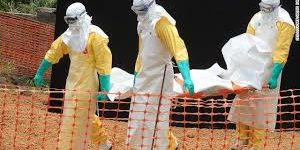Health authorities in the Democratic Republic of the Congo have declared a resurgence of Ebola, following confirmation of one case in the country’s eastern province of North Kivu.
A 46-year-old woman died on 15 August 2022 in Beni, a town located in North Kivu. She received care at the Beni Referral Hospital, initially for other ailments, but subsequently exhibited symptoms consistent with Ebola virus disease. She was hospitalised for 23 days and when she died her family collected the body.
Both the Beni and Goma branches of the country’s National Institute of Biomedical Research (INRB) confirmed Ebola virus in samples taken from the patient.
Analyses showed that the case was genetically linked to the 2018-2020 Ebola outbreak in North Kivu and Ituri Provinces—the country’s longest and largest.
“Ebola resurgences are occurring with greater frequency in the Democratic Republic of the Congo which is concerning. However, health authorities in North Kivu have successfully stopped several Ebola flare-ups and building on this expertise will no doubt bring this one under control quickly,” said Dr Matshidiso Moeti, World Health Organization (WHO) Regional Director for Africa.
WHO staff and health authorities in the Democratic Republic of Congo working to stem the spread of the disease, having identified 160 contacts whose health is being closely monitored. Investigations are ongoing to determine the vaccination status of the confirmed case.
There are 1000 doses of the rVSV-ZEBOV Ebola vaccines available in the country’s stockpile, 200 of which will be sent to Beni this week. Ring-vaccination—where contacts and contacts of contacts are vaccinated to curb the spread of the virus and protect lives—is expected to begin shortly.
The last flare-up in North Kivu’s Beni health zone was brought under control in about two months, ending on 16 December 2021. There were 11 cases (eight confirmed, three probable), including six deaths.
WHO will also work to ensure proper infection prevention and control measures are in place, that treatment can be made available for those who need it, and to raise awareness about Ebola among local communities.

